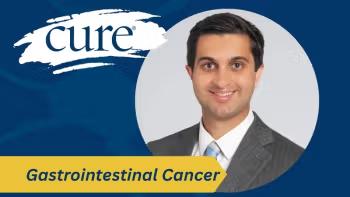
- Spring 2019
- Volume 18
- Issue 2
Settling the Stomach: Emerging Treatments for Gastric Cancer
Emerging facts about the genetics that drive gastric cancer are leading to new treatments for the disease.
When Bill Crismon received a diagnosis of a tumor at the junction of his stomach and esophagus in 2010, his doctors took a sample and conducted a genetic test that was new to gastrointestinal cancers. The test was designed to detect whether his tumor had a gene abnormality that caused overproduction of HER2, a protein that promotes the development and spread of cancer.
The first drug that inhibits the HER2 protein, Herceptin (trastuzumab), was initially approved back in 1998 to treat HER2-positive breast cancer. The Food and Drug Administration (FDA) OK’d its use in metastatic gastric cancer and cancer of the gastroesophageal junction, the type Crismon had, in 2010, after research showed that the HER2 mutation can also occur in gastric cancers.
Crismon, who was treated near his home in Little Rock, Arkansas, tested positive for the HER2 alteration, and his cancer had spread to his liver and lungs. He underwent seven cycles of chemo­therapy with the drugs fluorouracil and cisplatin. He also had a tumor removed from his esophagus, plus surgery to remove the left lobe of his liver, followed by six additional cycles of chemotherapy and electroporation of his lung lesions. Throughout, he also received Herceptin every three weeks.
Crismon, 66, a retired medical technologist, was declared cancer-free in 2012. He still receives Herceptin every three weeks to prevent a recurrence but doesn’t require other treatment. It was a remarkable turn of events, Crismon says, considering he was originally given a prognosis of six to nine months. “I never dreamed I would still be here eight years later talking about it,” he says. “I’m so thankful for the research that was done in breast cancer. I’m a tagalong beneficiary of that.”
Advances in gene sequencing over the past decade have produced a plethora of data about the genetic forces that drive gastric cancers. Some genes that have been implicated in the disease develop somatic mutations, or alterations that occur in the cancer cells themselves, as with HER2. In other cases, genes are carried as germline mutations, which are present from birth and passed down through families, that raise the risk of gastric cancer. With the rapidly growing understanding of all these abnormalities, gene testing is becoming routine in the treatment of the disease. If it isn’t done as a matter of course, patients can ask for it.
“Now we can do broad-panel genetic testing of tumor tissue and blood at diagnosis, which gives us all the information that we need to know up front to plan the treatment path,” says Daniel Catenacci, M.D., director of the gastrointestinal oncology program at the University of Chicago. “We also make an effort to repeat the testing as patients’ cancers progress,” because genetic changes might occur over time that can be addressed with targeted treatments, he says.
EXPANDING STANDARD TREATMENT
Gastric cancer starts in the stomach, which sits right below the esophagus, a tube that leads down from the throat. Nearly all these cancers are adenocarcinomas, which develop from the cells in the innermost lining of the stomach. Other types of gastric cancer include lymphoma, gastrointestinal stromal tumor and carcinoid tumor, according to the American Cancer Society. Cancers of the gastroesophageal junction are different but related, espe­cially in later stages, when they may be treated similarly to advanced gastric cancers.
It is expected that 27,500 stomach cancers will be diagnosed and 11,000 people will die of the disease this year.
Standard treatments include surgery, chemotherapy and radiation; targeted therapy, such as the Herceptin Crismon took; and immunotherapy, which can be added to treat advanced disease.
About one in five patients with gastric cancer has HER2- positive disease, according to the American Cancer Society, and Herceptin has made a major impact in the treatment of these tumors. However, many gastric cancers that are HER2 positive either don’t respond to the drug or stop responding and progress over time.
One idea for boosting Herceptin’s effectiveness is to combine it with checkpoint inhibitors, drugs that improve the ability of the immune system to recognize and attack cancer. At the American Society of Clinical Oncology Gastrointestinal Cancers Symposium in January 2019, researchers from Memorial Sloan Kettering Cancer Center in New York City presented results from an ongoing study combining chemotherapy and Herceptin with the immunotherapy Keytruda (pembrolizumab) in patients with metastatic disease who had not been treated before. Keytruda is a checkpoint inhibitor that interferes with the activity of the protein PD-1.
The researchers reported that none of the 32 evaluable patients experienced disease progression, and the overall response rate to the drug regimen (the proportion of patients whose disease burden was reduced by a prespeci­fied amount) was 87 percent. That level of response “is unprecedented,” says Yelena Janjigian, M.D., chief of the gastrointestinal oncology service at Memorial Sloan Kettering, who presented the findings at the symposium. “So far, the data (are) really promising. We have three patients with complete responses to the treatment,” meaning their tumors disappeared. The combination treatment, which is in phase 3 testing, did have side effects, including anemia and diarrhea, but most patients did not report them as serious.
Now, second-generation drugs are targeting HER2 in clinical trials, with some showing promise. In January 2018, a team of researchers led by Catenacci reported encouraging results from an early trial of one of those experimental medicines, margetuximab, which is being tested along with Keytruda. Margetuximab is an engineered antibody designed to both target HER2 and more efficiently activate cancer-killing immune cells.
The researchers released updated results from the trial in January 2019, reporting a 22.4 percent overall response rate to the combination treatment. But in patients with gastric cancer that expresses high levels of HER2 protein and elevated PD-L1 — a biomarker that indicates patients are likely to respond to PD-1-targeting checkpoint inhibi­tors — the responses were even better, and some patients showed no evidence of disease, Catenacci says.
“We saw high response rates of 50 to 60 percent with very long durability” in patients who were positive for both HER2 and PD-L1, Catenacci says. That’s notable, he says, because whereas first-line standard therapy response rates for HER2- positive patients are similar, second-line chemotherapy response rates are just 25 to 30 percent. Previous studies of Keytruda alone in gastric cancer showed responses of about 10 percent, he added. “Our thought was that if we could use margetuximab to target HER2 and to recruit immune cells to the tumor environment, along with Keytruda, it would be like a double whammy — the best synergistic way to get at the tumor. That’s basically what we’re seeing,” he said. An ongoing phase 1/2 trial of the Keytruda-margetuximab combination is recruiting patients at 25 sites in the United States and Asia.
UNCOVERING CANCER-DRIVING MUTATIONS
Other tumor mutations being investigated as possible drug targets in gastric cancer include EGFR, FGFR2 and MET. Results so far have been mixed, with the best response rates coming in at 20 percent or less, Catenacci says. But so many clinical trials are testing various combinations of targeted and immunotherapy drugs that he believes all patients with gastric cancer could benefit from genetic testing. “The trend over the next year, I believe, is that we’ll be sequencing everyone’s cancer and also their normal DNA,” he says. “That will help us really identify what’s happening in the tumor itself and what was inherited.”
The same sequencing panels can also determine whether a patient’s gastric cancer is microsatellite instability (MSI)- high, which is also referred to as mismatch-repair deficient. MSI-high cancer cells are unable to repair their own DNA, so they have about 1,700 mutations, on average, compared with the 70 found in typical cancer cells. That makes them especially vulnerable to destruc­tion with checkpoint-inhibiting drugs like Keytruda.
A separate test can detect tumor mutational burden (TMB), or the number of mutations present in cancer cells. Some patients whose cancers are not MSI-high might still have a high TMB and therefore may be good candidates for checkpoint inhibitors, according to Janjigian. “Some patients with high TMB respond really well to immunotherapy,” she says. “We can calculate TMB from multipanel next-generation gene testing. That’s the advantage — in one test, you get multiple answers.”
Some inherited mutations also come into play in gastric cancer. Mutations in the gene CDH1 can be passed down in families and are known to cause a subtype of the disease called hereditary diffuse gastric cancer (HDGC). CDH1 makes the protein E-cadherin, which is essential for maintaining the health of the epithelial cells that line the stomach. CDH1 mutations that hamper E-cadherin production promote the formation of HDGC, with the disease often striking young adults. Patients with CHD1 mutations are also at higher risk of the lobular subtype of breast cancer.
No treatments specifically target this inherited form of gastric cancer, but testing patients with a new diagnosis for the CDH1 mutation is important, because it can help prevent the disease in family members. HDGC accounts for about 1 percent of the 900,000 cases of gastric cancer diagnosed worldwide each year, according to the National Institutes of Health. If the mutation is found before gastric tumors develop, carriers can opt to have their stomachs removed to prevent the cancer from developing.
UNDERSTANDING THE FAMILY CONNECTION
Inherited mutations that are known to play a role in other cancers may also raise the risk of gastric cancer. For example, mutations in the genes BRCA1 and BRCA2 have long been associated with breast and ovarian cancers, but a recent review of medical literature concluded that BRCA2 mutation carriers face double the risk of developing gastric cancer and people with BRCA1 mutations have a fourfold increased risk.
Then there’s Lynch syndrome, an inherited group of gene mutations that are most closely tied to colorectal cancer. Lynch recently was found to raise the risk of other cancers, including gastric and uterine cancers, and researchers have found a close tie between MSI-high tumors and the presence of the inherited cancer syndrome. A 2018 study of more than 15,000 patients published in the Journal of Clinical Oncology found that 16 percent of people with MSI-high tumors also had Lynch syndrome, and half of them had noncolorectal cancers, including gastric cancer.
“If the family history is consistent with Lynch syndrome, it’s definitely something that should be examined in gastric cancer patients,” says Manish Shah, M.D., director of the gastrointestinal oncology program and the Center for Advanced Digestive Care at NewYork- Presbyterian and Weill Cornell Medicine. The more that can be learned about the genetic underpinnings of the disease, he says, the easier it is for oncolo­gists to not only determine the best treatment for the patient but also advise close family members about whether they should undergo genetic testing.
As the oncology community learns more about mutated genes that can influence gastric cancer, drug developers are coming up with ways to target those abnormalities. Shah will be one of the researchers on a new trial investigating a therapeutic vaccine in patients with MSI-high tumors, including patients with gastric cancer. The vaccine, NOUS-209, is made from small proteins that are produced by the most common MSI-high mutations. “The vaccine can educate the patient’s immune system against these common mutations that occur,” Shah says.
“It’s very exciting research because (the vaccine) might also prevent cancer in patients who are prone to getting it because of
their mismatch-repair status.”
Even more insight into the genetic drivers of gastric cancer could come from ongoing “basket trials,” which focus less on where cancer occurs in the body and more on the gene mutations that cause the disease. One such study is the National Cancer Institute-Molecular Analysis for Therapy Choice. In June 2018, during an American Society of Clinical Oncology conference, the institute released results from the trial that included positive data on two experimental drugs being tested in patients with gastric cancer, one aimed at HER2-positive tumors and the other at FGFR-mutated cancers. The society also has a basket trial of its own called the Targeted Agent and Profiling Utilization Registry.
Shah says he’s optimistic that these mutation-focused studies will enhance the search for more effective, targeted treatments for gastric cancer. “There’s been a lot of research activity, and we will continue to find drugs that change the landscape,” Shah says. “I’m sure of it.”
Articles in this issue
over 6 years ago
Striking a Match: Pairing Patients with Survivor Mentorsover 6 years ago
Making Lemonade: When Life Hands You a BRCA Misdiagnosisover 6 years ago
Running in the Familyover 6 years ago
Flower Power: Medical Cannabis for Cancer Side Effect Managementover 6 years ago
Comments From Our Readers on Recent CURE Publicationsover 6 years ago
The Road Forward for Medical Cannabis is a Complicated One


